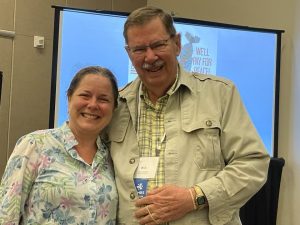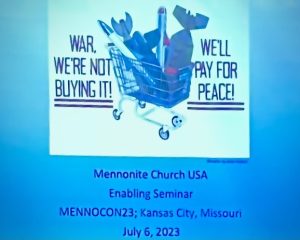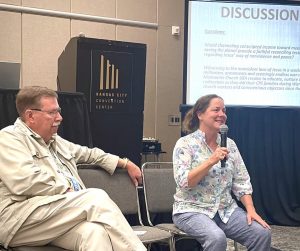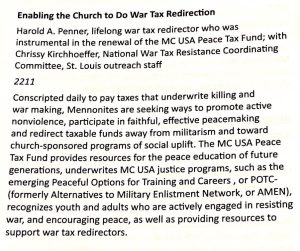
NWTRCC Outreach Consultant Chrissy Kirchhoefer and H.A. Penner at MennoCon 23. Photo by Byron Clemens
When the largest denomination of Mennonites in the U.S. met in Kansas City for MennoCon 19, H.A. Penner, along with other Mennonite war tax resisters, had put together a proposal that the Mennonite Church U.S.A. renew its Church Peace Tax Fund. The historical peace church had previously established a war tax alternative fund in the 1980s to lend support to those refusing to fund violence. The workshop to discuss renewing the fund encompassed lively discussion with many in agreement that they would like to see the Mennonite Church USA establishing a new fund. A few months later the church leadership approved the proposal.
H.A.shared his hopes “This fund is designed to provide the spiritual resources, human solidarity and material aid necessary to support and equip those who, because of conscience, choose not to pay taxes that underwrite war and militarism.” In the few years since the Church Peace Tax Fund has been operating, tens of thousands of dollars have been put into the fund which provides resources for the peace education of future generations and underwrites justice programs like the emerging Peaceful Options for Training and Careers (POTC) program.
Menno Con returned to Kansas City in early July of this year with thousands of Mennonites gathered at the Convention Center to attend workshops and worship services. Noticeable was a large contingent of youths. H.A. Penner invited me to join him in presenting at the workshop titled “Enabling the Church to Do War Tax Redirection.”

Slide presentation by H.A. Penner at Menno Con 23 in Kansas City
H.A. compiled a comprehensive slideshow presentation that explored the long tradition and varied ways of Mennonites refusing to participate in war. One particular story about Joseph and Micael Hofer whose refusal to participate in World War I led to them being sentenced to 20 years of hard labor at Fort Alcatraz. They were tortured for their refusal to work and were sent to the disciplinary barracks at Ft. Leavenworth. They arrived 8 days after the end of World War I; both were dead 3 weeks. The conditions that the Hofer brothers and other Conscientious Objectors (COs) suffered motivated the traditional peace churches consisting of the Mennonites, Quakers and Brethren to advocate for alternative service and the Civilian Public Service camps that were established for COs during World War II.

Discussion Period at Menno Con 23 Photo by Bryon Clemens
Peppered throughout the presentation were questions posed to the audience about how to respond to the militarism so prevalent in our society and inquiring how paying and participating in war are connected. The discussion that ensued with the 30 plus people present was engaging! Some people wanted to know the practicals of WTR, some shared specifics of how they have gone about WTR over the years, and some spoke of supporting young people taking on WTR. One of the most compelling questions asked about how to promote entire congregations to take part in WTR and to share the Mennonite Church USA’s support of WTR to leverage more power and impact.
It was in the group discussion that made evident that the vision of establishing the Church Peace Tax Fund that H.A.described was already a living reality. The solidarity was palpable; the strength and courage seemed to be expanding before my eyes. It was inspiring to be among a community engaged in effective peacemaking and expanding upon those programs. It was great to share some of NWTRCC’s many resources with an enthusiastic and receptive crowd!

Menno Con 23 War Tax Redirection Discription
Post by Chrissy Kirchhoefer

It would be great if they would fund an update to Alternatives to the Peace Corps unless it has been or is being updated.
Ginny, the Mennonite Church does have a program alternatives to military enlistment network. There is more information about it here https://anabaptistworld.org/peaceful-option-for-careers-and-training-potc-announces-steering-committee-action/ I am not aware of Alternatives to the Peace Corps but maybe others are?